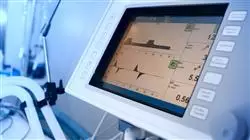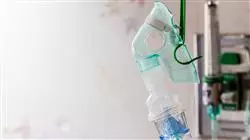University certificate
Accreditation/Membership
The world's largest faculty of nursing”
Introduction to the Program
Improve your knowledge of Pulmonary Nursing through this program, where you will find the best teaching material with real cases. Learn with us about the latest advances in the specialty to be able to perform quality nursing practice”

The objective of this Master's Degree in Pulmonary Nursing is to update the knowledge of nurses interested in the respiratory therapies that are currently available, so that they can acquire new therapeutic skills and techniques, apply them in their usual clinical practice, and in turn contribute to the future development of new research.
Patients undergoing respiratory treatment require proper therapeutic compliance and the nursing staff is responsible for empowering these patients and providing them with individualized care, tools that this Master's Degree provides in order to achieve excellence in care.
Throughout the program, students will be shown the most prevalent respiratory pathologies, they will perform anatomo-physiological overviews and consider the different alternatives for respiratory therapies in adult patients. Furthermore, it provides up-to-date and innovative information on aerosol therapy, oxygen therapy, sleep disorders treatments, non-invasive and invasive mechanical ventilation for intubated patients. It also provides detailed information about patients with specific characteristics, such as tracheostomized patients, pediatric patients and lung transplant patients, all of whom require specific treatment and care. Lastly, the program opens the door to new avenues of research, providing possible fields of action in terms of respiratory patient education, innovation, telemedicine, gamification and the dissemination of research results.
The program design consists of an online methodology with a total of 1,500 study hours. The whole program is presented through high-quality multimedia content. There will be clinical case analyses elaborated by experts in respiratory therapies, explanatory videos for the different therapies, photos of the materials used for the different techniques, and the most recent developments and innovations in the field will be provided.
Update your knowledge through this Master's Degree in Pulmonary Nursing”
This Master's Degree in Pulmonary Nursing contains the most complete and up-to-date scientific program on the market. Its most important features include:
- More than 75 clinical cases presented by experts in Pulmonary Nursing
- Graphic, schematic, and practical contents created in order to provide scientific and practical information on those disciplines that are essential for professional practice
- The latest information on care and intervention in Pulmonary Nursing
- Contains practical exercises where the self-evaluation process can be carried out to improve learning
- Algorithm-based interactive learning system for decision-making in the situations that are presented to the student
- With special emphasis on evidence-based nursing and research methodologies in Pulmonary Nursing
- All of this will be complemented by theoretical lessons, questions to the expert, debate forums on controversial topics, and individual reflection assignments
- Content that is accessible from any fixed or portable device with an Internet connection
This Master's Degree may be the best investment you can make when selecting a refresher program for two reasons: in addition to updating your knowledge of Pulmonary Nursing, you will obtain a degree from TECH Global University”
Its teaching staff includes professionals in the field of respiratory therapy, who bring to this program the experience of their work, in addition to recognized specialists belonging to leading scientific societies.
The multimedia content, developed with the latest educational technology, will provide the professional with situated and contextual learning, i.e., a simulated environment that will provide an immersive training program designed to train in real situations.
This program is designed around Problem-Based Learning, whereby the professional must try to solve the different professional practice situations that arise throughout the program. For this purpose, the nurse will be assisted by an innovative system of interactive videos created by recognized experts in the field of respiratory therapies with great teaching experience.
Increase your confidence in decision-making by updating your knowledge through this Master's Degree"

Take the opportunity to learn about the latest advances in Pulmonary Nursing and improve patient care"
Why study at TECH?
TECH is the world’s largest online university. With an impressive catalog of more than 14,000 university programs available in 11 languages, it is positioned as a leader in employability, with a 99% job placement rate. In addition, it relies on an enormous faculty of more than 6,000 professors of the highest international renown.

Study at the world's largest online university and guarantee your professional success. The future starts at TECH”
The world’s best online university according to FORBES
The prestigious Forbes magazine, specialized in business and finance, has highlighted TECH as “the world's best online university” This is what they have recently stated in an article in their digital edition in which they echo the success story of this institution, “thanks to the academic offer it provides, the selection of its teaching staff, and an innovative learning method aimed at educating the professionals of the future”
A revolutionary study method, a cutting-edge faculty and a practical focus: the key to TECH's success.
The most complete study plans on the university scene
TECH offers the most complete study plans on the university scene, with syllabuses that cover fundamental concepts and, at the same time, the main scientific advances in their specific scientific areas. In addition, these programs are continuously being updated to guarantee students the academic vanguard and the most in-demand professional skills. In this way, the university's qualifications provide its graduates with a significant advantage to propel their careers to success.
TECH offers the most comprehensive and intensive study plans on the current university scene.
A world-class teaching staff
TECH's teaching staff is made up of more than 6,000 professors with the highest international recognition. Professors, researchers and top executives of multinational companies, including Isaiah Covington, performance coach of the Boston Celtics; Magda Romanska, principal investigator at Harvard MetaLAB; Ignacio Wistumba, chairman of the department of translational molecular pathology at MD Anderson Cancer Center; and D.W. Pine, creative director of TIME magazine, among others.
Internationally renowned experts, specialized in different branches of Health, Technology, Communication and Business, form part of the TECH faculty.
A unique learning method
TECH is the first university to use Relearning in all its programs. It is the best online learning methodology, accredited with international teaching quality certifications, provided by prestigious educational agencies. In addition, this disruptive educational model is complemented with the “Case Method”, thereby setting up a unique online teaching strategy. Innovative teaching resources are also implemented, including detailed videos, infographics and interactive summaries.
TECH combines Relearning and the Case Method in all its university programs to guarantee excellent theoretical and practical learning, studying whenever and wherever you want.
The world's largest online university
TECH is the world’s largest online university. We are the largest educational institution, with the best and widest online educational catalog, one hundred percent online and covering the vast majority of areas of knowledge. We offer a large selection of our own degrees and accredited online undergraduate and postgraduate degrees. In total, more than 14,000 university degrees, in eleven different languages, make us the largest educational largest in the world.
TECH has the world's most extensive catalog of academic and official programs, available in more than 11 languages.
Google Premier Partner
The American technology giant has awarded TECH the Google Google Premier Partner badge. This award, which is only available to 3% of the world's companies, highlights the efficient, flexible and tailored experience that this university provides to students. The recognition as a Google Premier Partner not only accredits the maximum rigor, performance and investment in TECH's digital infrastructures, but also places this university as one of the world's leading technology companies.
Google has positioned TECH in the top 3% of the world's most important technology companies by awarding it its Google Premier Partner badge.
The official online university of the NBA
TECH is the official online university of the NBA. Thanks to our agreement with the biggest league in basketball, we offer our students exclusive university programs, as well as a wide variety of educational resources focused on the business of the league and other areas of the sports industry. Each program is made up of a uniquely designed syllabus and features exceptional guest hosts: professionals with a distinguished sports background who will offer their expertise on the most relevant topics.
TECH has been selected by the NBA, the world's top basketball league, as its official online university.
The top-rated university by its students
Students have positioned TECH as the world's top-rated university on the main review websites, with a highest rating of 4.9 out of 5, obtained from more than 1,000 reviews. These results consolidate TECH as the benchmark university institution at an international level, reflecting the excellence and positive impact of its educational model.” reflecting the excellence and positive impact of its educational model.”
TECH is the world’s top-rated university by its students.
Leaders in employability
TECH has managed to become the leading university in employability. 99% of its students obtain jobs in the academic field they have studied, within one year of completing any of the university's programs. A similar number achieve immediate career enhancement. All this thanks to a study methodology that bases its effectiveness on the acquisition of practical skills, which are absolutely necessary for professional development.
99% of TECH graduates find a job within a year of completing their studies.
Master's Degree in Nursing in the Pneumology Service
Nursing has evolved over the years, specializing in providing multiple benefits that help improve the overall health of people. One of these advances is respiratory therapy, created to manage pulmonary diseases or pathologies in neonates, infants and adults. In order to provide nurses with the necessary knowledge to specialize in this area, at TECH we have developed a Master's Degree in Nursing in the Pneumology Service. A postgraduate course focused on techniques and procedures that help strengthen and repair lung function through the inhalation of medications. You will be able to treat patients with respiratory problems or at risk of suffering them; you will also learn all about the use of aerosol therapy, oxygen therapy and invasive and non-invasive mechanical ventilation. During 1,500 hours of online learning, you will be trained to improve the practice of your profession and obtain the necessary skills to perform these types of treatments. You will learn all this through theoretical and practical lessons taught through audiovisual formats. Update your knowledge and know the care that a person suffering from any type of related disease should receive.
Get certified in the largest Nursing School in Mexico
By taking this program with online teaching methodologies, you will learn all about the anatomy of the respiratory system, the physiology of pulmonary ventilation, the use of gas diffusion and the techniques of oxygen and carbon dioxide transport through the blood. This will allow you to investigate the anatomo-physiology of the respiratory tract and the assessment of pulmonary function. Additionally, you will specialize in promoting individualized care strategies for patients to provide follow-up and hospital accompaniment. In TECH Global University we have the most complete and updated scientific program in the market; the content of this curriculum was designed by a team of high-level specialists, you will participate in clinical analysis of multiple cases that will help you reinforce your skills in real situations. Because of this, you will be able to treat patients with pulmonary transplant or tracheostomized condition.







